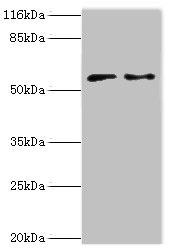Full Product Name
Rabbit anti-Homo sapiens (Human) CRISPLD2 Polyclonal antibody
Alternative Names
CRISP-11 antibody; CRISP11 antibody; Crispld2 antibody; CRLD2_HUMAN antibody; Cysteine-rich secretory protein 11 antibody; Cysteine-rich secretory protein LCCL domain-containing 2 antibody; DKFZP434B044 antibody; LCCL domain-containing cysteine-rich secretory protein 2 antibody; LCRISP2 antibody; MGC74865 antibody
Immunogen
Recombinant Human Cysteine-rich secretory protein LCCL domain-containing 2 protein (40-305AA)
Immunogen Species
Homo sapiens (Human)
Conjugate
Non-conjugated
The CRISPLD2 Antibody (Product code: CSB-PA884430LA01HU) is Non-conjugated. For CRISPLD2 Antibody with conjugates, please check the following table.
Available Conjugates
| Conjugate |
Product Code |
Product Name |
Application |
| HRP |
CSB-PA884430LB01HU |
CRISPLD2 Antibody, HRP conjugated |
ELISA |
| FITC |
CSB-PA884430LC01HU |
CRISPLD2 Antibody, FITC conjugated |
|
| Biotin |
CSB-PA884430LD01HU |
CRISPLD2 Antibody, Biotin conjugated |
ELISA |
Purification Method
>95%, Protein G purified
Concentration
It differs from different batches. Please contact us to confirm it.
Buffer
Preservative: 0.03% Proclin 300
Constituents: 50% Glycerol, 0.01M PBS, PH 7.4
Tested Applications
ELISA, WB
Recommended Dilution
| Application |
Recommended Dilution |
| WB |
1:500-1:1000 |
Storage
Upon receipt, store at -20°C or -80°C. Avoid repeated freeze.
Lead Time
Basically, we can dispatch the products out in 1-3 working days after receiving your orders. Delivery time maybe differs from different purchasing way or location, please kindly consult your local distributors for specific delivery time.
Usage
For Research Use Only. Not for use in diagnostic or therapeutic procedures.





